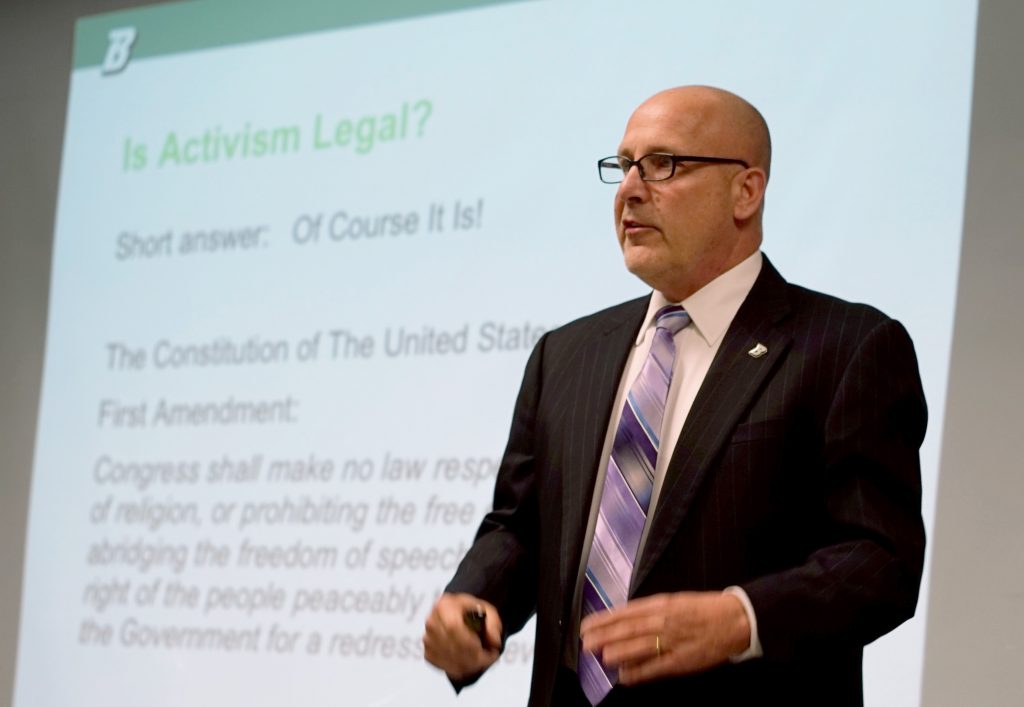
Binghamton University students, faculty and staff gathered in the New University Union on Thursday to learn about the rights of protesters on campus.
The workshop was organized by the Center for Civic Engagement (CCE) as part of the Passion to Action series, which is a series of workshops designed to teach members of the BU community how to be engaged citizens. Nadiya Al-Noor, the special programs assistant at the CCE, organized the talk. Al-Noor said that she often gets asked questions about safe and legal ways to protest on campus and in the local community.
“In the current political climate, a lot of people want to protest but don’t know what to do,” Al-Noor said. “Protests can go south very quickly, but they can go well if they are planned properly.”
Timothy Faughnan, chief of Binghamton’s New York State University Police, spoke at the event and discussed the legal issues surrounding protests. Faughnan began the workshop by discussing the First Amendment and the exceptions to the amendment that have been determined by the U.S. Supreme Court.
One such exception takes the form of time, place and manner restrictions, which have been repeatedly upheld by the Supreme Court. These restrictions allow the government to determine where, when and how a protest or rally can take place, provided that the government restrictions are reasonable and purposeful. Faughnan stated that protesters at the University should be aware of these restrictions.
During former President Barack Obama’s visit to campus in 2013, UPD made the decision to limit protesters to a designated space on campus. Faughnan said that due to safety concerns, protests often have to be limited based on these types of restrictions.
“The government cannot prohibit a public assembly, but it can impose restrictions on time, place and manner,” Faughnan said. “Still, you can’t be so stifling with time, place and manner that you stifle free speech.”
In addition, Faughnan discussed University guidelines and rules for protesting, including the rules for the maintenance of public order, which are set by the SUNY Board of Trustees and apply to all SUNY campuses. Faughnan stated that these rules outline specific procedures for law enforcement to follow if a protest gets out of control on a SUNY campus.
“Nobody ever wants to arrest somebody, but there comes a point where sometimes it has to happen,” Faughnan said. “We work hard on de-escalation and usually we have a good enough relationship with students that it works.”
Faughnan also advised protesters to be aware of other relevant rules and laws, such as the New York state penal law and vehicle and traffic law, because violations of these laws are common reasons for a protest to be shut down.
“[Issues that arise] are not always about the protest,” Faughnan said. “Sometimes what happens during the assembly is what becomes a problem. There are times when, due to safety concerns, we have to break up a protest.”
According to Faughnan, the best way to organize and plan a protest safely and legally is to work with law enforcement. He also encouraged protesters to stay alert to interlopers, as outsiders can sometimes change the direction or methods of peaceful gathering.
Attendee Christina Lee, a senior majoring in integrative neuroscience, said that although she has never been to a protest on campus, it was interesting to learn about the legalities surrounding them.
“It’s important for students to learn about their rights,” Lee said. “I’ve never been part of a protest on campus, and it was interesting to learn about it.”
Tom Lamphere, the senior staff assistant at the CCE, said that he came out of the workshop with a better understanding of the importance of collaboration between protesters and police.
“I came because I was interested in hearing the University police speak about protester rights,” Lamphere said. “The police aren’t here to be adversaries. They are here to support people, and I think they do a great job.”


